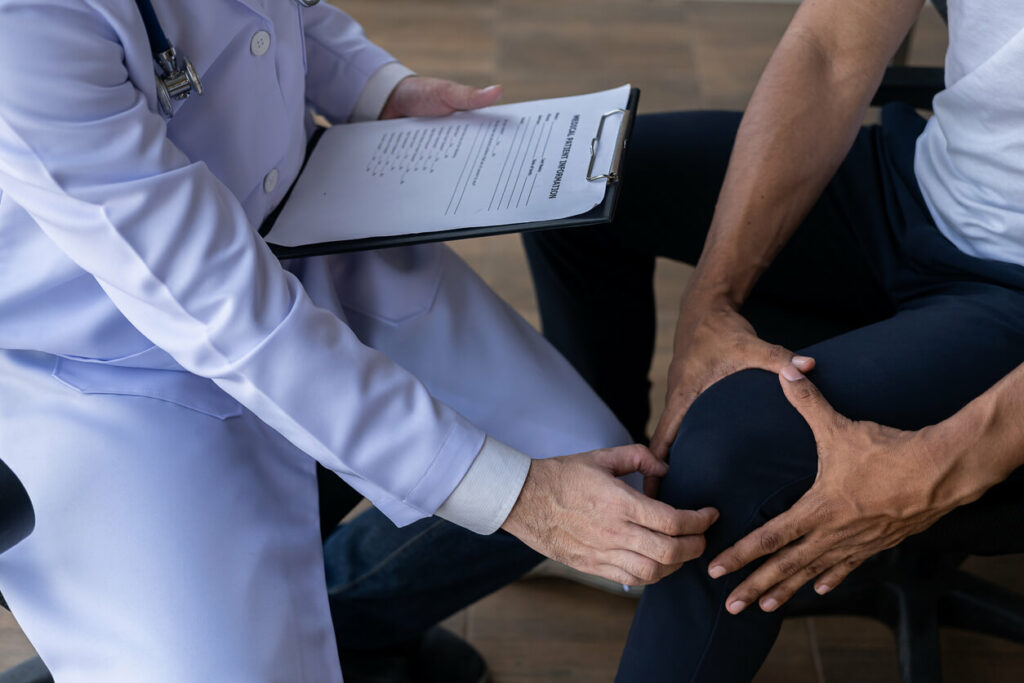
You should see an orthopedist if you are having problems with your muscles, bones, or joints. Primary doctors handle general health issues well, but musculoskeletal problems often need an orthopedist’s expertise. Understanding the correct choice of doctor impacts recovery and treatment success.
Orthopedists specialize in bones, joints, muscles, tendons, and ligaments. Their training helps them spot issues that general doctors might miss. Knowing when to see an orthopedist ensures faster and better treatment. Choosing the right specialist at the right time improves recovery.
1. Persistent Pain That Does Not Improve
Chronic pain that lasts more than a few days often needs special care. Primary care doctors can treat minor aches and short-term discomfort. However, ongoing pain might mean deeper issues.
Orthopedists find the main cause of long-lasting pain. They use advanced imaging and special exams. Their training helps them spot problems that general medical care might miss.
Pain that affects sleep or daily activities needs quick orthopedic attention. This kind of pain usually does not get better with basic treatments. Specialized care focuses on fixing the underlying issues.
2. Limited Range of Motion or Stiffness
Joint stiffness that makes movement difficult could be a sign of orthopedic problems. Primary care doctors can treat minor mobility issues with simple methods. However, serious movement limitations need a specialist.
Orthopedic surgeons like Dr. Michael L. Jones, Dr. Geoffrey M. Millican, and Dr. Raymond E. Skunda are experts in how joints and human movement work. They find the exact cause of mobility problems and create treatment plans to fix those specific issues.
For example, stiffness in the morning that lasts more than 30 minutes often points to inflammation. Orthopedists are trained to diagnose and treat complex problems like these. Getting care early can stop permanent joint damage.
3. Sports-Related Injuries
Sports injuries often need special orthopedic care. Primary care doctors can treat minor injuries well. However, serious injuries or repeated problems need an orthopedist.
Sports medicine orthopedists know the challenges athletes face. They create plans to help athletes return to activity safely. Their care helps avoid re-injury and long-term issues.
Serious injuries like fractures or ligament tears need quick orthopedic care. Emergency rooms often recommend follow-up with an orthopedist. Fast treatment by a specialist improves recovery.
4. Numbness or Tingling Sensations
Feelings of numbness or tingling often mean a nerve is being compressed. Primary care doctors can treat minor nerve issues, but ongoing symptoms need a specialist.
Orthopedic surgeons diagnose problems like carpal tunnel syndrome and pinched nerves. They understand how bones and joints affect nerves. They also treat both structural and nerve-related issues.
Worsening numbness or weakness needs quick orthopedic care. These signs could mean serious nerve damage. Early treatment helps prevent lasting nerve problems.
5. Joint Instability or Giving Way
Joints that feel unstable or “give way” when moving need to be checked by an orthopedist. This can mean ligament or structural damage, which primary care treatments often cannot fix.
Orthopedic surgeons are experts in joint stability and movement. They find the damaged areas causing the instability. Then, they create plans to restore proper joint function.
Repeated instances greatly increase the risk of injury. Each time it happens, more damage can occur. Orthopedic care helps stop further problems and protects the joint.
6. Previous Injury Problems
Old injuries causing ongoing problems need to be checked by an orthopedist. Complicated healing or lasting symptoms need a specialist.
Orthopedic surgeons understand how old injuries impact joint health over time. They find and treat problems that develop later, addressing both old and new issues.
Problems after surgery or with implants need quick orthopedic care. The original surgeon or another orthopedic specialist should handle these issues. Primary care doctors are not equipped to manage complex surgical problems.
7. Unusual Diagnostic Imaging Results
Unusual results from X-rays, MRIs, or CT scans often need an orthopedist to review. Complex results require a specialist to analyze and plan treatment.
Orthopedic surgeons are skilled at interpreting detailed imaging results. They match these findings with symptoms to make accurate decisions. Their expertise ensures the right treatment is chosen.
Imaging tests can show the following, which all need orthopedic care:
- Fractures
- Joint damage
- Structural problems
These issues often require specialized treatments, which orthopedists are best equipped to provide.
8. Work-Related Orthopedic Problems
Injuries from repetitive movements or workplace accidents often need an orthopedist. Primary care doctors can treat minor work injuries, but more serious cases require specialized care.
Orthopedists know how certain work activities lead to specific injuries. They design treatment plans to help workers return safely and prevent future injuries.
Workers’ compensation cases often need orthopedic care and records. Insurance companies expect specialists to handle serious injuries. Orthopedic assessments ensure proper treatment and records.
9. Age-Related Joint Problems
Arthritis and joint wear-and-tear often need care from an orthopedist. Primary care doctors can manage early arthritis symptoms. However, worsening joint problems require a specialist.
Orthopedic surgeons provide a full range of arthritis treatments. They know when simple treatments will work and when advanced care is needed. Their expertise helps guide the best decisions.
Anyone considering joint replacement definitely needs an orthopedic consultation. These big decisions require specialized knowledge. Orthopedic surgeons offer the latest treatment options.
Reliable Orthopedist in San Antonio, TX
Knowing when to see an orthopedist can prevent small issues from becoming big problems. Persistent pain, limited movement, or unstable joints need expert care. The Center for Orthopaedic Surgery and Sports Medicine offers personalized treatment. You can trust us, from simple care to surgery, to get you back to your active life.
Do not let orthopedic problems limit your quality of life. Call us at (210) 692-7400 to request a consultation today. You can also use our online appointment request form to schedule an appointment.
The best orthopedic surgeons in San Antonio look forward to serving you!

